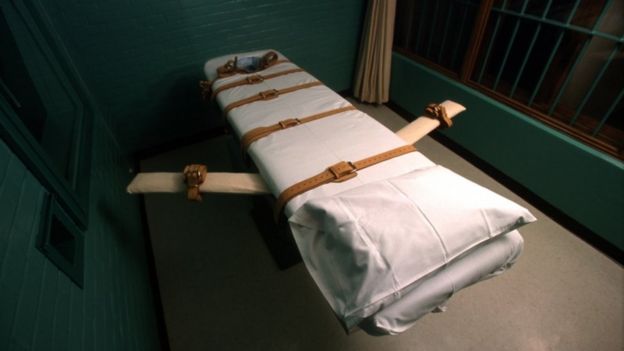
This article is more than
7 year old
The Catechism of the Church, a codified doctrine which sums up teachings, had previously stated that the death penalty could be used in some cases.
It now says it is "inadmissible because it is an attack on the inviolability and dignity of the person".
Pope Francis has spoken out against executions in the past.
Last October, he had said the Church's policy on the death penalty was one area where teaching was not static and could change with modern concerns.
The text of the catechism was first set by Pope John Paul II in October 1992, and earlier stated that the death penalty was "an appropriate response to the gravity of certain crimes and an acceptable, albeit extreme, means of safeguarding the common good".
However, the new text says there is "an increasing awareness that the dignity of the person is not lost even after the commission of very serious crimes".
It also argues that today's more effective detention methods protect citizens and "do not definitively deprive the guilty of the possibility of redemption".

The Church will now work with determination for the abolition of the death penalty worldwide, a statement from the Holy See said.
By James Reynolds, BBC News, Rome
The Catholic Church may base its faith on an unchanging Bible, but that does not stop the institution from updating some of its most important teachings.
Centuries ago, popes called Christians to Holy War, commanded their own armies, and showed little anxiety about the killing of their enemies. In modern times, popes have re-invented themselves as symbols of global peace. But until now the Church had taught that the death penalty was "an acceptable, albeit extreme means of safeguarding the common good".
Pope Francis - who has made mercy a theme of his papacy - has now decided that this has to change by ruling the death penalty "inadmissible". This may put the Church in direct conflict with conservative Catholics in the US who insist that capital punishment is justified.
Historically, the Church has mostly been unopposed to the death penalty, including into the 20th Century. In 1952, Pope Pius XII said it was not a violation of the universal right to life.
Pope John Paul II argued for imprisonment over execution wherever possible, although Joseph Ratzinger, who later became Pope Benedict XVI, wrote that the death penalty could be permissible.
The death penalty is still legal in 53 countries around the world.
In the United States, where 22% of the population are Catholic, execution is still legal in 31 states.
It is still also legal in Cuba, Dominica and Uganda - where about half of their populations are Catholic.
The only place in Europe where it is still legal is Belarus, which has a sizeable Catholic minority of about 7% of the population.
Burkina Faso, Madagascar and Benin, where significant chunks of the population follow Catholicism, have all outlawed the death penalty in recent years.